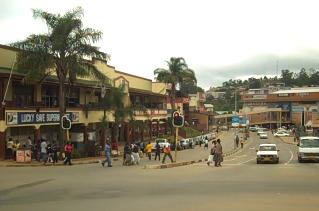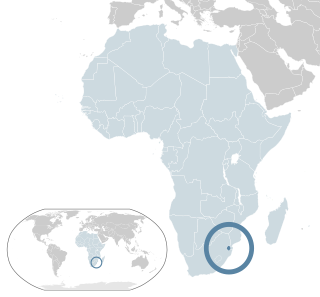
Eswatini, officially the Kingdom of Eswatini and also known as Swaziland, is a landlocked country in Southern Africa. It is bordered by Mozambique to its northeast and South Africa to its north, west and south. At no more than 200 kilometres (120 mi) north to south and 130 kilometres (81 mi) east to west, Eswatini is one of the smallest countries in Africa; despite this, its climate and topography are diverse, ranging from a cool and mountainous highveld to a hot and dry lowveld.
The economy of Eswatini is fairly diversified, with agriculture, forestry and mining accounting for about 13 percent of GDP, manufacturing representing 37 percent of GDP and services – with government services in the lead – constituting 50 percent of GDP.

Mbabane is the capital and largest city in Eswatini. With an estimated population of 94,874 (2010), it is located on the Mbabane River and its tributary the Polinjane River in the Mdzimba Mountains. It is located in the Hhohho Region, of which it is also the capital. The average elevation of the city is 1243 meters. It lies on the MR3 road.

The flag of Eswatini (Swaziland) was adopted on October 6, 1968 after Eswatini gained independence from the British Empire on September 6, 1968. The design of the flag is based on a flag given by King Sobhuza II to the Swazi Pioneer Corps in 1941.

The lilangeni is the currency of Eswatini and is subdivided into 100 cents. It is issued by the Central Bank of Eswatini. The South African rand is also accepted in the country. Similar to the Lesotho loti, there are singular and plural abbreviations, namely L and E, so where one might have an amount L1, it would be E2, E3, or E4.

The Swazi or Swati are a Bantu ethnic group of Southern Africa, predominantly inhabiting modern Eswatini and South Africa's Mpumalanga province. The Swati are part of the Nguni family that can be archaeologically traced in East Africa where the same tradition, beliefs and cultural practices are found. The Swati share a unique experience, culture and Royal lineage. This lineage is exclusive to the inhabitants of Eswatini, even though there have been more Swazi people that have moved to South Africa and the United Kingdom in the 20th century. The original inhabitants of Eswatini no longer reside in Eswatini as a majority population while some remain in the land. The Swazi people and the Kingdom of Eswatini today are named after Mswati II, who became king in 1839 after the death of his father King Sobhuza who strategically defeated the British who occupied Swaziland. The Kingdom of Swaziland was a region occupied by the San people of Southern Africa and the current Swazis came in from North Eastern regions through to Mozambique and eventually Swaziland in the 15th century. Mixtures with the San people and other Nguni tribes occurred. Their royal lineage can be traced to a chief named Dlamini I; this is still the royal clan name. About three-quarters of the clan groups are Nguni; the remainder are Sotho, Tsonga, others North East African and San descendants. These groups have intermarried freely. There are slight differences among Swazis as a nation with varying features and skin tones yet Swazi identity extends to all those with allegiance to the twin monarchs Ingwenyama "the Lion" and Indlovukati "the She-Elephant". The dominant Swati language and culture are factors that unify Swazis as a nation since there is no other language spoken except for English.

Manzini is a city in Eswatini, which is also the capital of Eswatini's Manzini Region. The city is the country's second largest urban centre behind Mbabane, with a population of 78,000 (2008). It is known as "The Hub" of Eswatini and lies on the MR3 road. Eswatini's primary industrial site at Matsapha lies near the town's western border.
Articles related to Eswatini include:

Lesbian, gay, bisexual, and transgender (LGBT) rights in Eswatini are limited. LGBT people face legal challenges not experienced by non-LGBT residents. According to Rock of Hope, a Swazi LGBT advocacy group, "there is no legislation recognising LGBTIs or protecting the right to a non-heterosexual orientation and gender identity and as a result LGBTI cannot be open about their orientation or gender identity for fear of rejection and discrimination". Homosexuality is illegal in Eswatini, though this law is in practice not enforced.

Eswatini–United States relations are bilateral relations between Eswatini and the United States.

The following outline is provided as an overview of and topical guide to Eswatini:

Christianity is the dominant religion in Eswatini. The relative prevalence percentage vary by source. According to Pew Research, over 88% of the total 1.2 million population of Eswatini express Christianity to be their faith, over 10% express no affiliation. According to the US State Department religious freedom report of 2012, local religious leaders estimate that 90% of Eswatini's population is Christian, 0.2% is Muslim, while under 10% belong to other religious groups. According to the CIA world fact book, the distribution is 40% Zionist, 20% Roman Catholic, Muslim 0.2%, other 30%. In other sources such as Clay Potts, the religious demographics are 80% Christian, and 20% Traditional Swazi religion.

Eswatini–Russia relations are the bilateral relations between the nations of Eswatini and Russia.

Eswatini–South Africa relations refers to the current and historical relationship between Eswatini and South Africa. South Africa surrounds Swaziland on the north, west and south. The two states share strong historical and cultural ties. Mutual High Commissions were established in Pretoria and Mbabane at the end of the apartheid era in 1994. Swaziland's High Commission in Pretoria is also accredited to Botswana, Lesotho, Namibia, Zambia and Zimbabwe.

A foreign national wishing to enter Eswatini must obtain a visa unless they are a citizen of one of the eligible visa exempt countries.

The Embassy of Swaziland in Taipei is the embassy of Eswatini in Taipei, Republic of China (Taiwan). The two countries have had diplomatic relations since Swaziland's independence in 1968. However, Swaziland was initially represented in Taipei by a Consulate.

Eswatini–India relations refers to the international relations that exist between Eswatini and India. The High Commission of India in Maputo, Mozambique is concurrently accredited to Swaziland. India also maintain an Honorary Consulate General in Mbabane. Swaziland does not have a diplomatic mission in India.
SwaziBank, is a development finance institution, which doubles as a commercial bank in Eswatini. It is licensed and supervised by the Central Bank of Eswatini, the national banking regulator. As of March 2018 SwaziBank was the only indigenous commercial bank in the county, with the other three having their headquarters in neighboring South Africa.

Matata is a town in Eswatini.















